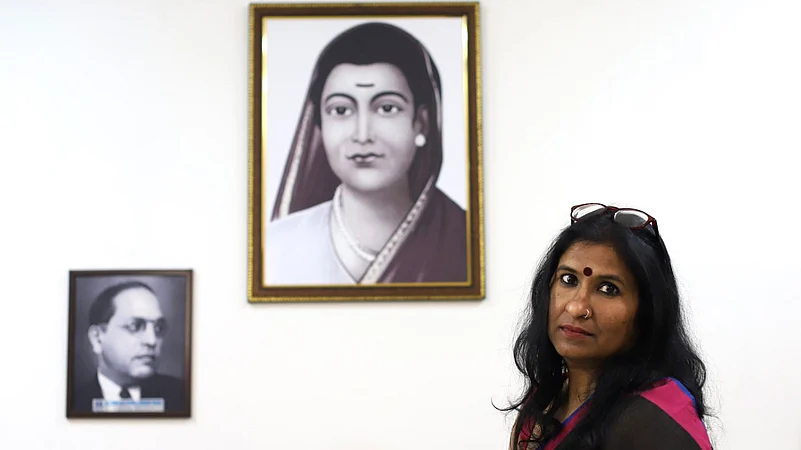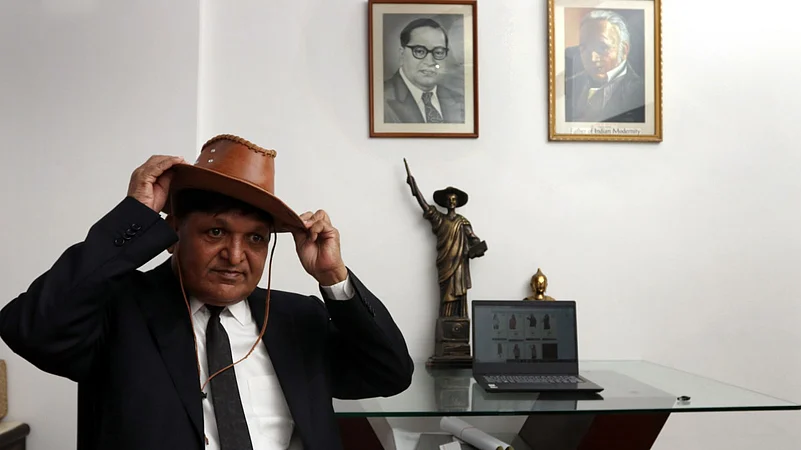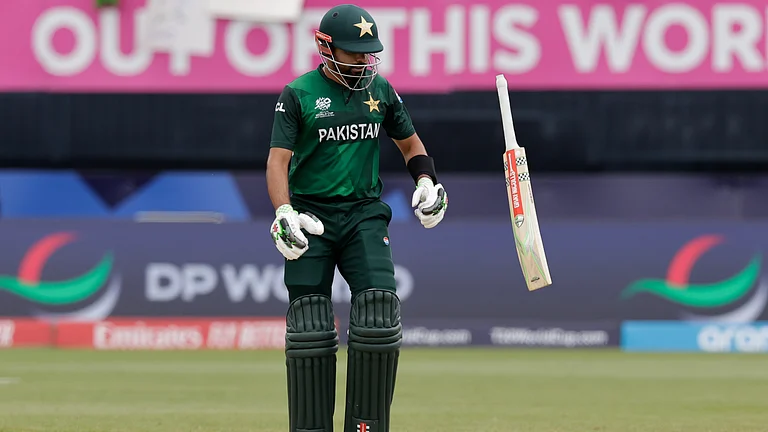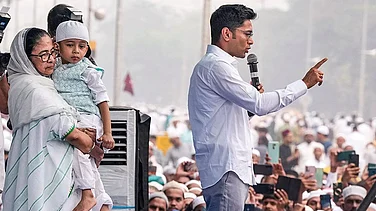For the artisans of Chamaar studio in Mumbai, it was like moving from a bag full of dreams to empty bags. Sachin Sakhare, an artisan working at the studio is barely managing to survive. Though things are opening up, there are no buyers. With his voice breaking up, Sakhare says, “Phir bhi hum asha nahi chorenge" (We will not give up on hope). We have an online space with our founder-designer, Sudheer Rajbhar, but nothing much is happening there too. After all, buyers too need disposable income to buy our products.”
It has been just four years since the Chamaar brand was launched. Before it could find its feet, the pandemic started. “When we launched the brand, the response was good. But now there is absolutely no business. There is no help from the government. We are just struggling to make ends meet. I’m currently surviving on my contractual sweeper’s job with BMC. It’s my only source of income. Hence I am giving it more importance, because life has to go on and we need food to fill our stomachs.”

Economic disparity is one of the most important reasons of Dalit vulnerability. Though the government has introduced measures to assist the community for their economic empowerment, especially in rural areas, but due to lack of information and awareness, very few are able to access these to start their small-scale industries and businesses. And Covid has worsened the situation for the Dalits.
Grijesh Dinker, a Dalit activist and advocate hailing from a middle-class Dalit family in Rajasthan, says, “Generally in rural areas, the public buys groceries on credit. In this time of stress, the earning of grocery shop owners collapsed. They are running out of stocks in their shops due to shortage of capital and a closed wholesale market. On top of that, they have to repay their loans.”
Many of the shops have shut down, and the owners are compelled to turn to alternative livelihoods. Dinker, who has worked with the NGO Centre for Dalit Rights in Jaipur, explains that Covid has also badly affected cattle farming due to drop in demand because of the lockdown and rise in cost of necessary items. Dalit women in states like Punjab, Haryana, Uttar Pradesh and Bihar got an opportunity to start their own small, cottage industries, through self-help groups, but Covid has also affected that work.
Dinker point out that if we look at human development indices, Dalits are at the lowest level in all factors, be it health, malnutrition, poverty or education, etc. A large proportion of Dalits are under the poverty line, because for centuries, they have been denied access to asset-building economic resources like land—which are sources of economic empowerment for other social groups. Thus, Dalits have remained cut-off from the mainstream of development, including access to housing, agricultural land, credit facilities, etc. Hence, the disparity continues.

There’s also economic disparity within different sub-castes of the community, such as Musahars of Bihar, who remain at the lowest position in the caste ladder.
In the aftermath of multiple lockdowns, few shops have managed to open up in Mumbai’s Dharavi. Dinker says, “Most of the industries are shut and are on the verge of shutting down. It is pertinent to quote the pathetic condition of one of the most vulnerable and marginalised groups called Sapera in Kanpur (rural), under Rastpura Gram Panchayat, who are snake charmers. There are over 1,000 households in different settlements, who are starving because of mobility constraints due to the pandemic.”
“Chamaar studio doesn’t have much visibility in the online space,” adds founder-designer Sudheer Rajbhar, who started the designer boutique that melds business with sustainability and Dalit pride. Born and brought up in the slums of Mumbai, he studied art in the city, but has no formal training in design. Till Covid, he and other artisans of the studio were busy giving a new lease of life to discarded rubber and other waste products, by recycling these into bags, belts, shoes and jackets. That has now changed.
Chamaar studio had a nomadic idea where artisans converted their homes into workshops. Rajbhar adds, “I had a small studio in Dharavi and Bandra, but now all of them are closed. We built the e-commerce site during the first lockdown. There has to be a platform for us to sell the products we’re making. We just can’t afford a shop to showcase our products. But our online visibility is also very low.”

There isn’t sufficient help coming from the State to save Dalit entrepreneurship. Dalit entrepreneurs say that in a few villages, community members approached the central government through village secretaries to seek support to save their industries and repay their loans, but only got Rs 500-Rs 700 per head, with many requests remaining unheard. Shramik Card-holders also obtained nominal support from the government of Rs 500.
Dinker says, “At this crucial time when governments and public representatives are focusing on vested interests, leaving the marginalised communities to die of starvation or Covid, with no means of livelihood, Dalit activists came forward to support their brothers and sisters.”
Rajbhar explains, “We also want to enter the luxury brand space, but here, we’re struggling to survive, so everything is becoming a distant dream. I want to open my studio in Colaba, and for that, we’re making a few products. But again, there is no guarantee that we’ll be able to do it, because our existing business is running at a complete loss. Most of our artisans have left Mumbai. We have four artisans left here.”
In almost all states, grassroots Dalit workers and Ambedkarites having links with different NGOs, managed to get support in cash and kind for the community. Requests were also sent to international and national NGOs for support. Dinker adds, “During the lockdowns, Dalit activists were roaming and surveying Dalit settlements, putting their lives at risk to extend help to the starving Dalit households.”
All India Dalit Mahila Adhikar Manch (AIDMAM), a movement started by National Campaign on Dalit Human Rights (NCDHR), also distributed dry ration among the community in different parts of the country for 2-3 times since the pandemic hit. AIDMAM also monitored incidents of caste violence during the first lockdown, helped community members register complaints, and followed up cases of deprivation during distribution of ration by government agencies—from PDS rations to accessing work under MNREGA.
A huge share of the migrant workers who walked back home during the first lockdown were Dalits. Community activists struggled to manage their documents to enable them to obtain help from the government.
Well-known Dalit entrepreneur Chandra Bhan Prasad, who runs a leather business from Delhi manufacturing shoes, bags and jackets says, “Sales has dropped drastically for Dalit shoemakers. I have a Dalit friend who makes jeans. His sales too have collapsed. I have also closed down my office as I was losing more than Rs 20,000 per month and there was no business happening. I even had to close down my online platform. Now people have realised that all they need to live is food and medical facilities.”

Dinker feels the community also knows how to take a stand against injustices and misdeeds of law enforcement agencies, and to raise collective voices. The rising number of cases registered under Prevention of Atrocity Act is evidence of increasing awareness among the community of their legal rights. Community members are also entering politics via the 73rd and 74th constitutional amendment, and supporting their members to win elections.
Pandemic or not, Dalit entrepreneurs claim they don’t have unfettered access to the “free market” because of discrimination. Hence, they need middlemen, and rarely get the high rates they deserve. But still, owning small-scale business is more empowering than doing work for others, such as labourers in firms and fields, or manual scavenging of streets and toilets.
Talking about self-sufficiency among Dalits, Dinker says, “I don’t know if there is a model of self-sufficiency among the community, but when Dalits try to access available measures to develop their livelihoods or entrepreneurship, the first challenge they face is accessing credit or loans from banks, as they don’t have collateral resources to mortgage.”
In the last 15-20 years, Dalits have gradually started getting access to credit, but that has increased violence against them. Dinker explains, “As a result of upward mobility, Dalits in Haryana are getting access to small creditlines to start their own businesses. Not too long ago, they were labourers. When they decided to become self-sufficient and started sending their children to schools, they started facing violence.”
Chandra Bhan Prasad is himself involved in identifying, recognising and encouraging young Dalit entrepreneurs and youths. Under his tutelage, a group of new Dalit entrepreneurs is coming up. Dinker explains, “Access to the market and to bank credit or collateral is not sufficient. Social capital is also important. If someone from business communities like Agrawal wants to start a business, he brings with him social capital and will be able to get support from 10 other Agrawals. But when a Dalit wants to start a business, he has to do it on his own. We lack that social capital.”





















